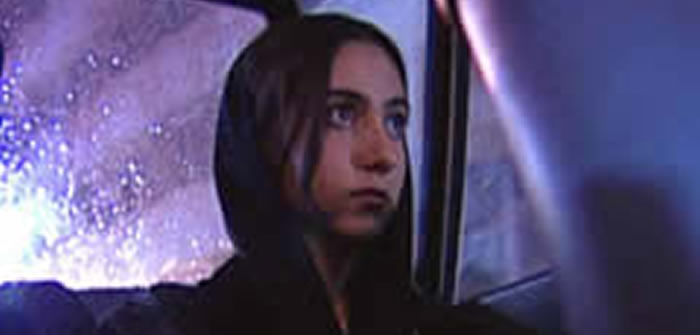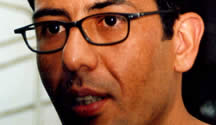 An interview with Iranian-Dutch Filmmaker Ramin Farahani
An interview with Iranian-Dutch Filmmaker Ramin Farahani
Ramin Farahani is an independent filmmaker based in Amsterdam and Tehran. He studied Film directing at the Cinema and Theatre faculty of the Art University in Tehran 1989-93, followed by another study in the same direction at the Dutch Film and Television Academy in Amsterdam 1997. His last film is a documentary titled “Jews of Iran” shown in many international film festivals such as Warsaw Jewish Film Festival 2005, New Zealand International Documentary Festival 2005 and San Francisco Jewish Film Festival 2006.
“Jews of Iran”
The Jewish settlement in Iran dates back to 2700 years. The Islamic Revolution of 1979 resulted in the departure of many Jews from the country. This film concentrates on Jews living in Iran presently, with an eye on recent historic developments. Jews in Tehran, Isfahan, and Shiraz relate various kinds of discrimination they face, but the film also describes positive aspects of Iranian society, including the friendship between two tolerant Muslim and Jewish families.
Shohreh Jandaghian- What prompted you to make the first documentary about Jewish community in Iran?
Ramin Farahani- Many things. First of all I was interested in minorities, especially after having lived in a minority in the Netherlands. On the other hand, among the three official religious minorities in Iran, Jews have experienced more pressure and almost no body dared to make a film about them. There have been some attempt to do so in the past, but none of these projects led to a complete film. It seems I somehow opened the way; because after my film, few reporters made short items on Jews inside Iran. Recently BBC has broadcast one item, mainly focused on city Yazd, the birthplace of the Israeli president, Moshe Katsav who also appears in this film, made by BBC correspondent.
Shohreh- How was your personal experience with Iranian Jewish community when you were still living in Iran?
Ramin- I had no contact with the Jews. I left Iran in mid nineties, which was not a good period for minorities, especially in terms of interaction with the whole society. On the other hand you can barely distinguish a Persian Jew from other Iranians. Because they all look the same and almost all of them speak Persian instead of Yiddish or Hebrew. But for instance Persian Armenians speak their own language, making you able to notice them when passing their neighbourhood or hearing their Persian with a specific accent.
Shohreh- This is your first film after eleven years being far from Iran. How was your impression about filmmaking in Iran comparing eleven years before?
Ramin- I shot this film in late 2002 but it got ready to be broadcasted in Dutch TV in early 2005, due to some delays. So, I was making a film in Iran after 8 years being away from there. Back to your question, there was not a big difference if we talk about censorship and the way they control media. Not to forget that the efforts of former Iranian reformist President, Khatami to create a more open society at that time, was a base on which I wished I could relay, starting a difficult project.
By the way, I was changed a bit as well, and needed to adapt myself to the situation again, which was some times very hard. Because Iran is not a very transparent society and you get to do with hidden elements you have no clue of it. It is not always the system, but also many individuals and people you have to work with. They are not always clear and may even manipulate you, for their own benefits, destroying your project.
Shohreh- How did you find the film’s characters? Did you know about them before you start shooting?
Ramin- This was one the most difficult parts of my work. During the research, I made few friends and kept in touch with them. For instance I knew the story of the young girl who appears at the beginning of the film, long before we shot. The Shirazi’s musicians I met during a Jewish sport match and later at Mellat Park in Tehran, which is a meeting point for Jews at Sabbath evening. But mainly I met people before shooting. The problem is that Iranians, especially Jews, are not that open toward the camera, and this is understandable. It may cause them trouble.
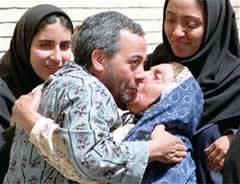 Shohreh- What were some surprises you had while making this documentary?
Shohreh- What were some surprises you had while making this documentary?
Ramin- We got attacked by some wrong Jewish figures on the third day of shooting in a Jewish gathering place near Isfahan. I was then about to stop the project. But this was exactly what these people and the brains behind, wanted me to do. So, after a short emotional recovery, I started again.
Shohreh- Did You have some trouble getting the film off the ground, in terms of attracting funding and so on? Can you talk about this?
Ramin- Not that much trouble. I searched for related possibilities, ending up in NIK media, which was located at the educational department of Dutch television at that time. It took me about a month to make a contract, which is actually very fast. I had also another options and NIK media realized it would be a lost chance if they wait longer. So they gave me their trust and enough money and I left to Tehran for the research.
Shohreh- Have you shown your film in Iran?
Ramin- Unfortunately not to the public. Just to some friends and relatives. The cinema department of the ministry of culture excluded this film from participation in Kish documentary festival in 2004, although it was selected by the festival jury for the competition. By doing so, I was sure that they never would allow me a public screening. It is absurd that one department of the same ministry allows you to make a film, and the other department bans the same film from a very small festival, where just fellow documentary makers and journalist will watch it.
Anyway my film has been illegally recorded from the Dutch TV or from an illegal satellite broadcasting, and it’s in circulation among Jewish community inside Iran since 2005.
The responses of some of people appearing in the film were very positive, as far as I heard, but some were also concerned about possible consequences. The Iranian Jews had never seen before a whole film about their small community, which approaches them with respect and sympathy.
Shohreh- And how was the reaction of viewers out of Iran?
Ramin- The reaction of Jews and Iranians outside was mainly emotional because they got more feeling with the things we show in the film…I heard of wet eyes,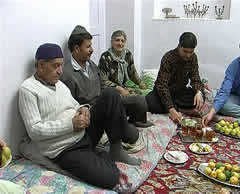 nostalgic feelings for missing roots etc. But I got also some critics why this film does not show anything of the hard times for Iranian Jews like after the revolution and days they couldn’t even have a passport and so on. I explained that I focussed more on recent situation, due to the possibilities.
nostalgic feelings for missing roots etc. But I got also some critics why this film does not show anything of the hard times for Iranian Jews like after the revolution and days they couldn’t even have a passport and so on. I explained that I focussed more on recent situation, due to the possibilities.
In general, my film gave a positive image of Jewish life in Iran, because the image which is created outside, is so dark that even a softly critical film like mine, helps westerners to correct their image and see the nuances inside.
Shohreh- Why you didn’t go the fiction way? Why documentary?
Ramin- It went automatically. I think the emerging issue in a society which is partly isolated, is to recover the unseen reality, instead of wandering in your fantasies; at least for such subjects. But making a fiction based on a good understanding of reality could be an option as well. You will just need more money for that.
Shohreh- What do you think could bring the two communities of Jewish and Moslems closer together in Iran?
Ramin- The main obstacle is the media policy of Iranian regime regarding Jews. They never show an informative item on Iranian Jews or Judaism, which brings more understanding among the Moslems. And if by accident they do so, they don’t want Jews to look sympathetic.
On the other hand you have to do with religious fanaticism in both Moslem and Jewish communities, which keeps both parts separated from each other. I think these kind of people need to work more on what they have in common, as it has been given a try during Khatami’s period, in form of inter-religious conferences etc. But the trend nowadays seems to be the counterpart.
Shohreh- Do you have plans in participating in other film festivals in 2006?
Ramin- My film has been shown in the main Jewish festivals especially in North America and there are still more to come. In San Jose, late October. In LA after several screenings, again in November. The 5th screening in New York will be in February 2007, I think.
Shohreh- What are your upcoming projects?
Ramin- I am trying to write a fiction scenario now. In the meanwhile, I am also thinking on documentary project, but I can’t say exactly which plan is to realize.
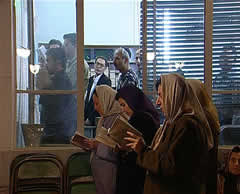 Shohreh- Is there any point you would like to stress concerning your experience of filmmaking in Iran?
Shohreh- Is there any point you would like to stress concerning your experience of filmmaking in Iran?
Ramin- There was a certain disorientation regarding expressive activities inside Iran, since new government took power mid 2005. Now the policies are clearer, it seems that new limitations have also affected the independent filmmaking, at least that’s how I experience it.
Shohreh- Thanks for taking the time in answering my questions, Ramin.
Ramin- My pleasure!
The DVD of “Jews of Iran” is available on these pages:
http://raminbox.blogspot.com/2006/09/jews-of-iran-documentary.html
http://www.geocities.com/raminbox/Jews-of-Iran.html
Reprinting or republishing of this article is only possible by Digital Journal Online permission. Please write us at btehrani@digitaljournalonline.com .

